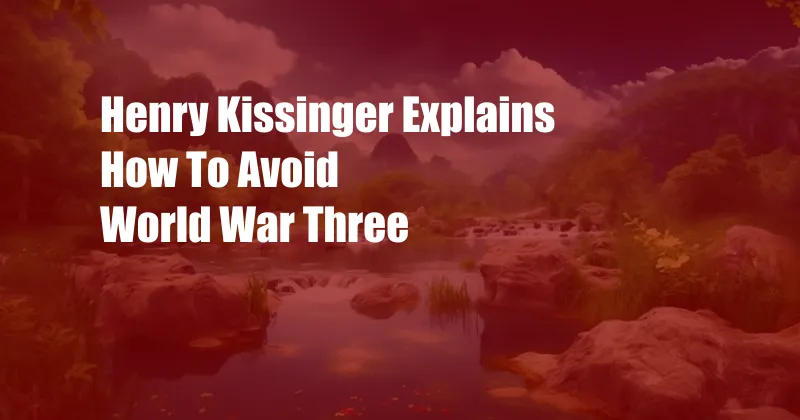
Kissinger’s Blueprint: Steering Clear of World War Three
In the labyrinth of human history, the scourge of war has left an enduring mark. The prospect of a Third World War, with its potential for catastrophic consequences, looms as a sobering reality that demands our attention. Against this backdrop, the wisdom of renowned diplomat and strategist Henry Kissinger resonates more profoundly than ever. In this article, we delve into Kissinger’s insights, exploring his roadmap for averting global conflict and safeguarding a peaceful future.
Kissinger’s Imperative: Avoiding Nuclear Catastrophe
Nuclear weapons stand as a chilling testament to human ingenuity and folly. Their destructive potential, capable of annihilating entire cities in a matter of seconds, has cast a long shadow over international relations. Kissinger, mindful of this existential threat, has repeatedly emphasized the absolute imperative of avoiding nuclear war. His belief stems from the fundamental recognition that such a conflict would obliterate any semblance of civilization and rob humanity of its future.
Diplomacy and Détente: The Pillars of Peace
Kissinger’s approach to conflict resolution is rooted in the principles of diplomacy and détente. Diplomacy, the art of resolving disputes through negotiation and compromise, offers a non-violent means of addressing grievances. Détente, a period of reduced tensions and heightened dialogue, creates a favorable atmosphere for cooperative solutions. Kissinger advocates for relentless diplomatic efforts, even in the face of adversity, as the only viable path to sustainable peace.
Understanding Nuclear Strategy: Prudence and Deterrence
Kissinger posits that a comprehensive understanding of nuclear strategy is paramount for preventing misunderstandings and escalation. He differentiates between nuclear deterrence, a defensive measure to deter an attack, and nuclear war fighting, an offensive approach that could trigger a catastrophic conflict. Kissinger emphasizes the importance of maintaining a robust nuclear deterrent while avoiding provocative rhetoric or actions that could destabilize international relations.
Avoiding Miscalculations and Strategic Crises
Miscalculations and strategic crises are potentially deadly pitfalls that could lead to unintended escalation. Kissinger warns against the tendency to overreact to perceived threats or to underestimate the resolve of adversaries. He advocates for clear communication and risk assessment to mitigate misunderstandings and reduce the likelihood of crisis situations.
Managing Conflict Zones: Diplomacy and Regional Stability
Conflict zones, such as Ukraine or the Korean Peninsula, pose significant challenges to global peace. Kissinger emphasizes the need for tailored diplomatic efforts to address the underlying causes of instability. He argues that these efforts should involve all parties concerned and focus on creating sustainable solutions that build confidence and reduce tensions.
Tips and Expert Advice from Kissinger
- Maintain a Dialogue with Adversaries: Seek opportunities for communication and negotiation, even with those you disagree with.
- Avoid Provocative Actions: Restraint and tactful diplomacy can help prevent escalation and signal a willingness to resolve conflicts peacefully.
- Foster Regional Stability: Support efforts to promote cooperation and economic development in conflict-prone regions.
- Respect Nuclear Red Lines: Recognize the dangers of nuclear escalation and avoid rhetoric or actions that could trigger a nuclear conflict.
Common FAQ on Kissinger’s World War III Prevention Strategy
Q: What is Henry Kissinger’s primary concern regarding World War Three?
A: Kissinger believes a Third World War, particularly one involving nuclear weapons, would be a catastrophic event that could obliterate civilization.
Q: How does Kissinger propose to prevent a nuclear conflict?
A: He advocates for diplomacy, détente, and a clear understanding of nuclear strategy. He also stresses the importance of avoiding miscalculations and managing conflict zones effectively.
Q: What role does communication play in Kissinger’s strategy?
A: Kissinger emphasizes the vital importance of maintaining a dialogue with adversaries and using clear and effective communication to reduce misunderstandings and mitigate risks.
Conclusion
Henry Kissinger’s insights on avoiding World War Three provide a profound and nuanced perspective on a critical issue facing humanity. His emphasis on diplomacy, dialogue, and strategic prudence offers a roadmap for navigating complex international relations and preserving global peace. By embracing his wisdom, we can collectively work towards a future free from the horrors of nuclear conflict.
Are you interested in learning more about Henry Kissinger’s strategies for avoiding World War Three? Share your thoughts and questions in the comments below. Let’s engage in a dialogue to safeguard a peaceful future for ourselves and generations to come.